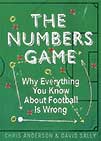 Why everything you know about football is wrong
Why everything you know about football is wrong
by Chris Anderson and David Sally
Viking, £12.99
Reviewed by Barney Ronay
From WSC 318 August 2013
This book didn’t have an easy start in life. At first glance, and for the first 100 pages or so, it is hard to look beyond the instant wrong turn, the unhesitating literary hari-kari, of that terrible title. Yes. Everything you know about football is wrong. Everything. Wrong. All of it. Presumably this includes all the bits you may have picked up from reading Soccernomics and its imitators, not to mention the many articles, columns and blogs to have addressed already the central conceit of The Numbers Game – the idea that football is a sport still mummified by cliche, folk wisdom and superstition; and that it is only via the forensic scalpel of the insistent academic outsider that this tapestry of mediaeval idiocy can be swished away to reveal The Truth beneath.
It is an approach that speaks very clearly to the way football is now consumed, a sport that has long since evolved at its top level into a sprawlingly incontinent mass media event. To be interested in football is not so much to support a team, to seek the connections and consolations of old-school fandom, as to enter an ongoing and irresolvable mass argument. True understanding can only be reached through wider reading, more zingily up-to-date stats. So much so that at times modern football appears to be less a form of entertainment as a kind of strident shared academic discipline, a mob-handed codification of the pub bore dynamic, and the idea that what is important in all this is to be right.
If The Numbers Game suffers at points from the fact that it must gear itself towards its natural readership, the winning-an-argument-at-work group, then there is also a fascinating and highly readable book in here. The authors Chris Anderson and David Sally are described as “a football statistics guru” and “a baseball pitcher turned behavioural economist” (aren’t we all darling) and together they have some interesting and original arguments to make, expertly illustrated with stats, graphs and a broad sphere of reference.
This is essentially a book about “the inner truth” of football’s numbers, albeit the attempt to stretch this into an absolute truth is at times a little gauche. Why don’t all teams attempt to perfect the long throw, given its statistical success, the book demands, suggesting an obsession with aesthetics and “beauty” is behind this omission, when in fact it is as much to do with the more tangible tactical demands of rhythm and speed, a coherent and non-wishy-washy requirement for quicker, less random restarts. Barcelona can also produce some pretty convincing stats on this point.
Quibbles aside The Numbers Game is an illuminating experience, with some excellent passages – the Darren Bent analysis (surprisingly effective) is fascinating, as is the deconstruction of Chelsea’s hire and fire policy. And if there is some unintentional humour in the recurrent deification of the “heroic” Roberto Martínez – everything I know about football may be wrong but I do know that Wigan have since been relegated – then this is simply a reminder that football remains a game where the numbers, like the rest of us, must follow at one remove.